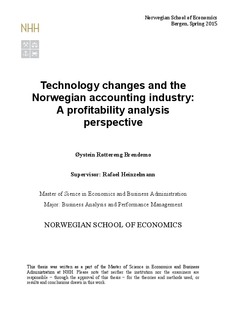Technology changes and the Norwegian accounting industry: a profitability analysis perspective
Abstract
This thesis analyzes the Norwegian accounting industry using the framework of strategic
management accounting. The perspective chosen is that of a strategic profitability analysis.
Focus is placed on how the development and adoption of new technology are affecting the
industry, and how the industry can adapt to changes.
The empirical data has been collected using two case studies and a small sample of firms. The
thesis starts with a macro- and industry analysis of factors influencing the Norwegian
accounting industry. Second, an analysis of profitability on the basis of a sample of twenty
firms from across the country is conducted. Third, an analysis of the most important drivers of
profitability is completed. Finally, changes and challenges caused by the development and
adoption of new technology are described. The discussion is continued further with a
suggestion to how the two case firms can adapt to changes caused by technology.
The analysis revealed that the influence from technology is strong and that profitability has
been rather good. However, we might expect the larger firms to dominate the industry in the
future. The small- and medium sized firms are currently the most profitable. Important drivers
of profitability are related to scale, capacity utilization, learning and spillovers, technology,
and interrelationships. The main challenge caused by technology is that revenue is lost due to
automation as tasks takes less time to complete. Firms can therefore no longer keep up with
the degree of invoicing they were used to. For the smaller firms, a focus strategy is suggested
as a «solution» to the challenges. The larger firms are better off with a differentiation strategy,
or even a low cost strategy.
